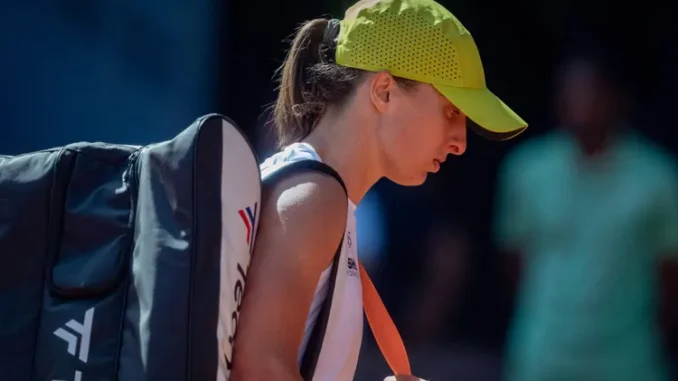
Iga Swiatek, the 24-year-old Polish tennis titan and world No. 3, has long been a symbol of dominance, with six Grand Slam titles and a bronze medal from the Paris 2024 Olympics. Yet, beneath her steely on-court persona lies a story of vulnerability that surfaced during a doping scandal in 2024, which she described as the “worst experience of my life.” In a heartfelt conversation on the *Served with Andy Roddick* podcast, recorded just before her second-round match at the 2025 National Bank Open in Montreal on July 30, Swiatek opened up about the gut-wrenching moment she learned of her positive test for trimetazidine (TMZ), a banned heart medication. The revelation left her sobbing for weeks, fearing she was “losing my integrity” and that “no one is going to believe me that I didn’t do anything wrong.”
The ordeal began on August 12, 2024, when Swiatek, then ranked No. 1, tested positive during an out-of-competition test before the Cincinnati Open. She was in Warsaw, mid-photoshoot with a sponsor, when an email from the International Tennis Integrity Agency (ITIA) shattered her world. “I was in a photoshoot with a sponsor in Warsaw, and I was in the middle of it. I saw that I got an email from this portal, and I thought it was just a reminder to do my whereabouts or something,” she recounted. “I started crying, and my agents who were at the shoot thought that someone had died.” For nearly 40 minutes, her face red from tears, Swiatek grappled with panic and confusion, barely able to continue the shoot. “It was a mix of confusion and panic. There was a lot of crying,” she told Polish channel TVN24, admitting the substance’s name—trimetazidine—was “completely unfamiliar” to her.
The ITIA’s investigation revealed a trace amount of TMZ (50 pg/ml) in her system, linked to contaminated melatonin tablets from a Polish manufacturer, LEK-AM Melatonina, which she used for jet lag and sleep issues. Despite not listing melatonin on her doping control form—a mistake she attributed to exhaustion and routine oversight—the ITIA deemed the violation unintentional, citing “no significant fault or negligence.” Swiatek accepted a one-month suspension from September 12 to October 4, 2024, missing three tournaments, including the China Open and Wuhan Open, and forfeiting $158,944 in Cincinnati prize money. “In the last 2½ months, I was subject to strict ITIA proceedings, which confirmed my innocence,” she said in an Instagram video, her voice trembling with relief but still carrying the weight of the ordeal.
The emotional toll was immense. “When everything came out [publicly], I was basically crying for two weeks, couldn’t practice, because I felt that tennis did this to me,” Swiatek confessed. “I felt like I was losing my integrity, like no one is going to believe me that I didn’t do anything wrong and that the whole world would turn their backs on me.” The fear of losing her hard-earned legacy—four French Open titles, the 2022 U.S. Open, and her 2025 Wimbledon crown—haunted her. She leaned on her psychologist, Daria Abramowicz, and her team, who scrambled to test her supplements. “I called Daria, and we met during the shoot,” she said, crediting her for helping navigate the chaos. Two WADA-accredited labs confirmed the melatonin contamination, vindicating her claim.
Public reaction was mixed. While the WTA rallied behind her, stating, “Iga has consistently demonstrated a strong commitment to fair play and upholding the principles of clean sport,” some peers, like Simona Halep, who faced a four-year ban for her own doping case, and Nick Kyrgios, hinted at preferential treatment. “I was scared that most of the people are going to turn their back on me,” Swiatek admitted, but she was heartened by Poland’s support. “I think their response has been more positive than I thought,” she said at a United Cup press conference. Her return to the court was rocky—she lost focus in Rome and struggled post-suspension—but her Wimbledon triumph, a 6-0, 6-0 demolition of Amanda Anisimova, marked a turning point. “I’m happy with my Wimbledon trophy now,” she told Roddick, her voice lighter but resolute.
As Swiatek faces Guo Hanyu in Montreal, her focus is back on tennis. “I try to just go on with my life and focus on preparing for the season,” she said, dismissing negative comments. The doping saga, though scarring, has only strengthened her resolve. With the U.S. Open on the horizon, Swiatek’s journey—from tears to triumph—proves she’s not just a champion, but a fighter who can weather the toughest storms.
Leave a Reply